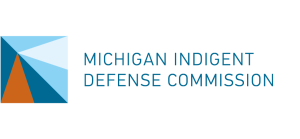View on Adobe Slate
The Michigan Indigent Defense Commission is moving quickly this spring, and we have a newly launched website now serving as the main resource to learn about our policies, standards and resources as we carry out the mission of improving indigent defense delivery systems statewide. The website is an important start to informing the criminal justice community and poor people charged with crimes about the steps we are taking to improve representation and to help ensure Michigan meets its constitutional obligations.
In addition to the statutory requirements to compile online versions of the Commission’s policies and reports, the MIDC will post on its website news and noteworthy issues, information about meetings and upcoming events, and links to helpful resources. The site will also be used to post proposed minimum standards for indigent defense, dates of public hearings, compliance models and plans and the process for seeking grant funding after a plan is approved.
The Commission met on June 9, 2015 and discussed the language of the first four standards being proposed now that the committee work is complete. Those standards cover the following areas: Education and Training of Defense Counsel, Initial Attorney/Client Interview, Investigation and Expert Witnesses, and Timing for Appointment of Counsel. All of the standards proposed are taken directly from, or contemplated in, the language of the MIDC Act.
For education and training: the proposed minimum standard will focus on the Ninth Principle of the American Bar Association’s Ten Principles of a Public Defense Delivery System, that a public defense system, in order to provide effective assistance of counsel, must ensure that “[D]efense counsel is provided with and required to attend continuing legal education.” The standard will require knowledge of the law, knowledge of forensic and scientific issues, knowledge of technology, and will contain continuing legal education requirements for counsel providing indigent defense.
The initial client interview standard will focus on United States Supreme Court Precedent and ABA Principles that recognize that the “lack of time for adequate preparation and the lack of privacy for attorney-client consultation [can preclude] any lawyer from providing effective advice.” See U.S. v. Morris, 470 F.3d 596, 602 (6th Cir. 2006). The standard will require a prompt interview of a client in a confidential setting.
The standard for experts and investigators will address the United States and Michigan Supreme Court holdings that require trial counsel to adequately investigate and seek appropriate expert assistance for the defense. The standard will require counsel to request funds for adequate investigation and use of expert witnesses.
The proposed minimum standard on timing for appointment of counsel will reflect the U.S. Supreme Court holding that assistance of counsel is required at critical stages of proceedings, starting with when a defendant’s liberty is subject to restriction by the court. The standard will require availability of counsel at first appearance in front of a judge or magistrate and at the pre-trial stage.
Final revisions to the proposals were made by the Commission as a whole and committee work has resumed to incorporate the changes. It is anticipated that by the end of June the MIDC will publish all four proposed standards on our website, michiganidc.gov. We will also distribute detailed information about how people can submit comments or suggestions about the first set of proposed standards.
The next MIDC meeting will serve as a public hearing on these proposals, and it will be held at WMU’s Cooley Law School simulcast at multiple campuses for that session. We want to hear from as many people as possible, and we want the process to be open to all stakeholders in the criminal justice community. Check the “Standards” page on our website, michiganidc.gov, for additional information.
Executive Director Jonathan Sacks spends at least one day every week on the road talking about the work of the Indigent Defense Commission. This past month, Jonathan traveled to multiple circuit and district court judges and administrator sessions to hear suggestions and concerns about the standards being proposed. Jonathan presented to judges and court staff in Crystal Mountain, Mt. Pleasant, Berrien, Saginaw and Van Buren, and he met with the public defenders in Chippewa and Bay County. The Genesee County Defender Program invited Jonathan to speak as well, and a room full of attorneys spent their lunch hour discussing concerns and inquiring about the work of the Commission.
In addition to formal presentations about the MIDC, Marla McCowan has also continued her focus on training around the state by attending and evaluating sessions in counties where continuing legal education is required already, such as Genesee, Oakland and Wayne. Marla also received a scholarship to attend the National Legal Aid and Defender Association’s National Defender Leadership Institute in South Carolina at the beginning of June, with a topical focus on meeting the training needs of public defenders. The MIDC Act requires continuing legal education for assigned counsel; our plan is to ensure that attorneys get the training that they need and want in order to do the best job they can for their clients.
The MIDC is very proud to have the support of Governor Snyder in his recent special message on Criminal Justice, where he talked about the work we have started on collecting data and establishing minimum standards. Recognizing that additional state dollars will be required to ensure the success of the Commission, Governor Snyder said that he looks forward to working with the Legislature on funding and he is “excited to watch Michigan become the model for other states to follow.”
